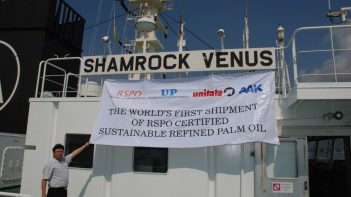| Click icon to download PDF |
First collaborative initiative is the joint study on RSPO and ISPO towards mutual vision of promoting sustainable palm oil
Jakarta, October 2013 – The Roundtable on Sustainable Palm Oil (RSPO) and the Indonesian Sustainable Palm Oil (ISPO) via a formal agreement today announced their cooperation towards promoting sustainable palm oil in Indonesia.
The first initiative under the partnership is a joint study to examine both voluntary international standards and mandatory national standards; this is being done through a collaboration between RSPO, the ISPO Commission of the Indonesian Ministry of Agriculture and the United Nations Development Program (UNDP). This is the first such co-operation between an international organization and a national body promoting sustainable production of palm oil.
“Indonesia, being the world’s largest producer of palm oil, has received much attention in recent years, particularly from global communities who are concerned about the sustainability of palm oil production, and ISPO is part of the Government of Indonesia’s response. ISPO will help to ensure that there is growth, equity, improved livelihoods and environmental integrity in the palm oil sector”, said Rosediana Suharto, Executive Chairman at the Indonesian Palm Oil Commission within the Indonesian Ministry of Agriculture. “We are glad that this joint study will now commence, and we hope that the outcome will help the Indonesian palm oil companies, especially the growers, in their efforts towards fully adopting sustainable practices.”
The RSPO-ISPO joint study was initiated also as part of the Sustainable Palm Oil (SPO) Initiative launched by the Indonesian Ministry of Agriculture, UNDP and members of the private sector, with the objective to promote sustainable palm oil production and operation in Indonesia. One of the key components of the SPO Initiative is the establishment of a multi-stakeholder platform, where stakeholders such as RSPO and ISPO can convene and discuss how to best work together to achieve sustainable palm oil in Indonesia.
“Inclusiveness and collaboration has always been the philosophy of the RSPO. The RSPO Principles and Criteria should be ambitious and yet pragmatic for growers in all the producing regions around the world so that market transformation to make sustainable palm oil the norm can be achieved”, said RSPO Secretary General Darrel Webber. “Through this joint study, we hope to clarify the disparities as well as to identify the synergies between the two certification schemes. Our single minded focus is to remove barriers and challenges amongst Indonesian oil palm growers due to the existence of two standards and to facilitate ease of certification, while maintaining the robustness and rigour of the audit process.”
The joint study will be conducted by a Certification Body, carefully tendered and selected based on proven capacity and experience in conducting successful audits for both certification schemes. The appointed Certification Body will carry out the study over a period of one month and will be expected to produce an analysis of the general principles and objectives and differences between the 2 schemes. The study will produce six key outputs, namely:
- A comprehensive tabulation of commonalities and differences between ISPO and RSPO Principles and Criteria ;
- An understanding of the similarities and differences between ISPO and RSPO, including the inclusion of smallholders in the certification standards;
- Recommendation on the possibility of combined/parallel audit for ISPO and RSPO standards, with the aim, amongst others, to optimize physical resources and reduce financial implications;
- A comprehensive listing of commonalities and differences of 16 categories of protected area and the six types of High Conservation Value areas (HCVs);
- A comprehensive listing of commonalities and differences between principles of Natural Reserves and Biodiversity related to AMDAL (AnalisisMengenaiDampakLingkungan) or Environmental Impact Assessment and HCV principles and its assessment, and a comprehensive understanding of the relevance of AMDAL to HCV requirement (assessment, management and monitoring). This output will also include a comprehensive understanding of the Greenhouse Gas emissions requirement in ISPO and RSPO and their methodologies;
“This is such an important initiative between the RSPO and ISPO which are working towards a common goal of achieving sustainable palm oil. It is also the first case ever in which a voluntary international standard and a mandatory national standard have been brought together in an effort to explore opportunities for synergy and collaboration,“ said a UNDP spokesperson. “We are confident that the RSPO-ISPO collaboration via this joint study will create a strategic alignment of efforts by the Indonesian government and by RSPO in creating a more environmentally and socially-responsible palm oil sector in Indonesia”.
The final outcome of the study will be published in a public discussion in December 2013.
-end-
About ISPO
The Indonesian Sustainable Palm Oil (ISPO) system is a policy adopted by the Ministry of Agriculture on behalf of the Government of Indonesia with the aim to improve the competitiveness of Indonesian palm oil in the global market and contribute to the objective set by the President of the Republic of Indonesia to reduce greenhouse gas emissions and improve sustainability.
ISPO is a compilation of existing Indonesian regulations, and is thus mandatory and reflective of the sustainability guidelines and aspirations of the Indonesian Government and other domestic stakeholders. ISPO is equipped with a certification mechanism, and the essence of ISPO is to facilitate palm oil producers/mills to comply with the existing law and regulations.
For more information, please contact:
ISPO Commission
Dr. Rosediana Suharto
Executive Director
+62 (0)21 782 7460
[email protected]
http://www.ispo-org.or.id/index.php?lang=ina
About RSPO
In response to the urgent and pressing global call for sustainably-produced palm oil, the Roundtable on Sustainable Palm Oil (RSPO) was formed in 2004 with the objective of promoting the growth and use of sustainable oil palm products through credible global standards and engagement of stakeholders. The seat of the association is in Zurich, Switzerland, while the secretariat is currently based in Kuala Lumpur with a satellite office in Jakarta.
RSPO is a not-for-profit association that unites stakeholders from seven sectors of the palm oil industry – oil palm producers, palm oil processors or traders, consumer goods manufacturers, retailers, banks and investors, environmental or nature conservation NGOs and social or developmental NGOs – to develop and implement global standards for sustainable palm oil.
Such multi-stakeholder representation is mirrored in the governance structure of RSPO such that seats in the Executive Board and project-level Working Groups are fairly allocated to each sector. In this way, RSPO lives out the philosophy of the "roundtable" by giving equal rights to each stakeholder group to bring group-specific agendas to the roundtable, facilitating traditionally adversarial stakeholders and business competitors to work together towards a common objective and make decisions by consensus.
| For more information, please contact: | |
| Contact for RSPO Secretariat: Stefano Savi Communications Manager T: +603 2302 1500 [email protected] |
Contact for Indonesia: Desi Kusumadewi RSPO Indonesia Director T: +62 21 5794 0222 [email protected] |
About the SPO Initiative
In order to facilitate sustainable palm oil production in Indonesia, the Ministry of Agriculture, United Nations Development Programme (UNDP) and several multinational corporations have partnered to develop the Sustainable Palm Oil (SPO) Initiative, with aims at helping Indonesia break new ground in terms of building a greener economy that promotes growth, equity and livelihood. The establishment of SPO is in line with UNDP’s mission to help countries such as Indonesia find ways to ensure that economic growth becomes sustainable and empowers the poor and the marginalized population. SPO is also a window of opportunity to create a more socially-responsible palm oil industry.
The SPO initiative aims to increase smallholder capacity and improve livelihoods, better protect the environment and reduce GHG emissions, through the following strategic components:
- Strengthen the capacity ofsmallholders focusing on good agriculture practices and environment protection;
- Strengthen ISPO standards to protect forests, enhance biodiversity conservation, and mitigate and monitor greenhouse gas (GHG) emissions;
- Facilitate social responsibility, empowering related communities and mediation systems;
- Reinforce the ISPO framework and clarify ISPO standards for wider acceptance; and
- Establish national and provincial platforms to ensure transparency in the sector and to promote sustainable palm oil.
For more information, please contact:
Tomoyuki Uno
Programme Manager
+62 (0)21 314 1308
[email protected]
ABOUT UNDP
UNDP partners with people at all levels of society to help build nations that can withstand crisis, and drive and sustain the kind of growth that improves the quality of life for everyone. On the ground in 177 countries and territories, we offer global perspective and local insight to help empower lives and build resilient nations.
Keep reading
Call for Proposal: Study on Wild Palms in West and Central Africa

RSPO hosts first Africa downstream sustainable palm oil supply chain forum in Cape Town

Nearly two decades on, Europe continues to drive global demand for RSPO Certified Palm Oil

Communicating Sustainable Palm Oil - examples of success across Europe
[EOT] Terms of Reference: Independent Smallholders Outreach Programme in Indonesia

RT2023 Delegates Propose Solutions to Reinforce RSPO’s Assurance System – End-Year Highlights of Assurance Standing Committee
RSPO UK Members' Day Examines Shifting Dynamics of Doing Business within Europe

Celebrating 20 Years of RSPO’s Sustainability Journey




